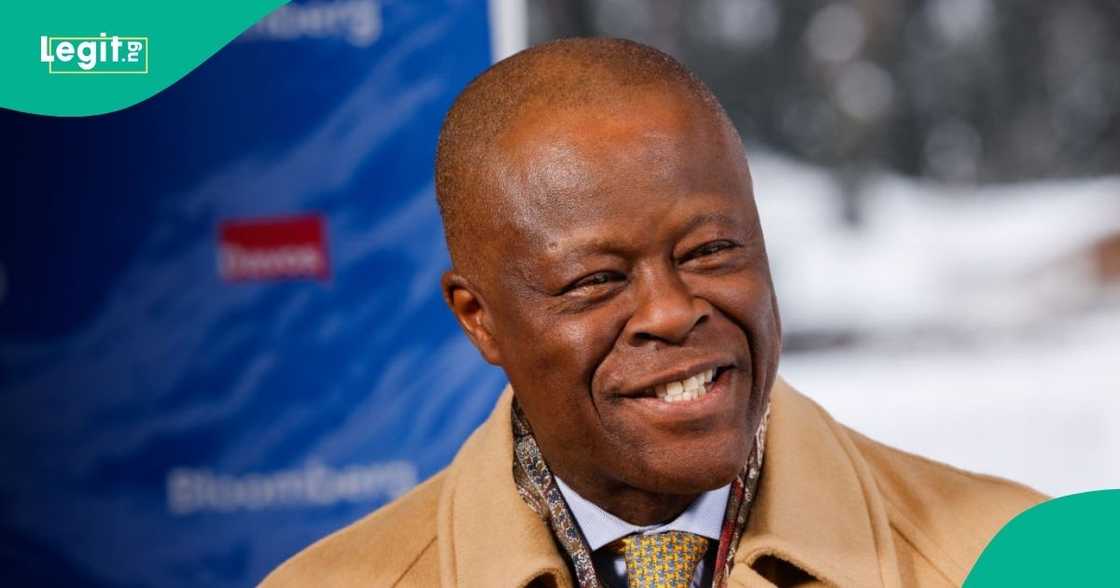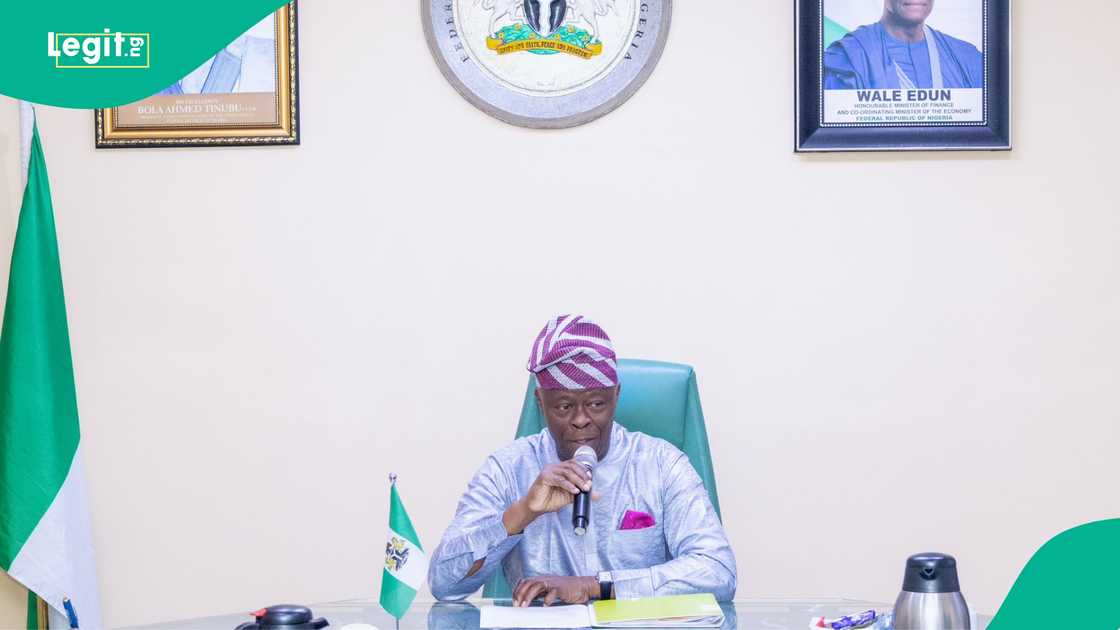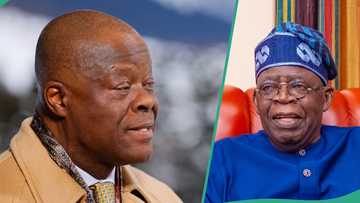When a Finance Minister Falls Ill: Why Transparency in Communication is Paramount
Editor’s note: In this piece, Dr 'Toks Oguntuga, a crisis communication expert, looks at the confusion around Finance Minister Wale Edun’s health. The analyst explains why clear, timely updates are crucial for public trust and economic confidence.
A finance minister is not just another bureaucrat occupying a plush seat at the cabinet table; he is the fiscal nerve centre of the national organism, the custodian of a nation’s economic bloodstream. His health and well-being are matters of public consequence. When he sneezes, investors catch a cold; when he falters, markets tremble. Therefore, the imperative of transparency in communicating his state of health is not a matter of courtesy but of economic stability and public trust.

Source: Getty Images
Over the weekend, a few media outlets reported that Nigeria’s Finance minister and coordinating minister of the economy, Mr Wale Edun, had suffered a stroke. The official response that followed was, regrettably, reactive rather than proactive, a disjointed attempt at containment that fell far below international standards of crisis communication. Only a handful of anonymous sources within the Presidency attempted to douse the embers of speculation, while the mainstream press fumbled through fragmented reportage that did little to enlighten the public.
According to The Punch, unnamed presidential officials confirmed that Edun was “indisposed,” “being attended to by Nigerian doctors,” and “recuperating in his Abuja home.” Yet, the phrasing itself betrayed confusion and contradiction. One source declared the illness “a bit serious”, a phrase so nebulous it invites more anxiety than assurance. Another, equally faceless, emphasised that “he’s still at home,” as if geography alone were evidence of good health.
Then came Bayo Onanuga, the president’s combative and pugnacious special adviser on information and strategy, asserting that the minister had “suddenly fallen ill” but was “recuperating in Nigeria.” Beyond these rhetorical contortions, there was no verifiable statement from the minister himself or from the Ministry of Finance; a vacuum of credibility was thus created in a matter that cries out for authoritative clarity.
This is where the edifice of Nigeria’s public communication collapses. What precisely is the nature of the Finance minister’s illness? If it is not a stroke, what is it? Malaria? Exhaustion? Food poisoning? Why cloak the truth in layers of needless mystery? Transparency, the golden thread that holds the fabric of public communication together, has once again been sacrificed on the altar of official secrecy.
The late president Yar’Adua’s health saga should have permanently inscribed one lesson on our national conscience: when government withholds truth, rumour becomes its spokesman. As W. Timothy Coombs reminds us that silence or stonewalling during a crisis invites speculation, and speculation always fills the vacuum of information with the worst possible interpretations.
Yet, the handlers of this present crisis seem oblivious to that wisdom. Their secrecy has birthed suspicion, their vagueness has fertilised gossip, and their lethargy has lent oxygen to rumour. A five-second video clip of the minister taking a gentle stroll in his compound would have sufficed to calm national nerves. But no. In Nigeria, we prefer to make a mountain of mystery out of a molehill of malady.
Falling ill is a human inevitability, not a crime. A transparent government must never treat it as a state secret, especially when the individual in question presides over the nation’s financial destiny. Concealment in such cases is not prudence. It is folly masquerading as discretion. The government’s attempt to downplay the issue, to trivialise public concern, is a colossal communication blunder. As James Grunig asserted,
“Organisations that communicate symmetrically with their publics build relationships that are more enduring than those built on manipulation or secrecy.”

Source: Twitter
The Singaporean example
Contrast Nigeria’s maladroit response with Singapore’s masterclass in crisis communication when its then-Finance minister, Heng Swee Keat, suffered a stroke on May 12, 2016. During a Cabinet meeting, Heng collapsed. Within hours, the Prime Minister’s Office (PMO) issued a transparent, contemporaneous statement:
“Minister Heng Swee Keat collapsed during a Cabinet meeting and was taken to hospital immediately. A CT scan showed he had suffered a stroke. Doctors are attending to him now.”

Read also
"He should’ve listened": Fresh twist in Ola of Lagos’ showroom demolition as new details emerge
That same day, Prime Minister Lee Hsien Loong took to Facebook, writing:
“Hope Swee Keat will be alright. He is a valuable member of my team.”
The PMO followed up promptly with more details: the cause (an ánèurýsm), the planned surgery, and the immediate delegation of duties to Deputy Prime Minister Tharman Shanmugaratnam. In the ensuing weeks, the government provided periodic updates: Heng’s recovery was “steady,” he was “fully lucid, communicative, and cheerful.” When he was finally discharged, the PMO reported his “excellent recovery” and announced that he would be on medical leave for rehabilitation.
Every step of the way, Singapore’s government exemplified timeliness, transparency, consistency, and empathy; the hallmarks of effective crisis communication. The messaging informed without invading privacy; it reassured without concealing reality. The result was textbook-perfect: public calm, media discipline, investor confidence, and institutional trust.
By contrast, Nigeria’s communication machinery appears to have learned nothing and forgotten nothing. What we have instead is a muddle of half-truths, anonymous whispers, and official opacity. Benoit’s Image Restoration Theory warns that the perception of deception is more damaging than the crisis itself. In other words, concealment magnifies crisis, while candour mitigates it.

Read also
Tinubu's Renewed Hope: Retired generals back calls for state of emergency in Nigeria, reason emerges
The moral of the matter is clear: secrecy breeds suspicion, suspicion breeds speculation, and speculation breeds chaos. Governments must understand that the public’s right to information is not a nuisance but a necessity for democracy. A transparent government does not lose authority by telling the truth; it gains legitimacy by doing so.
The Singaporean example remains a shining testament to what communication scholars call “crisis-induced credibility.” It demonstrates that truth, when promptly and professionally communicated, inoculates a government against the contagion of distrust. Nigeria’s communication handlers must learn that in the modern information ecosystem, opacity is not a strategy, it is su!cide.
Toks Oguntuga holds a PhD in Presidential Crisis Rhetoric and brings over ten years of experience navigating complex political and communication landscapes. He is an accomplished academic researcher, skilled in strategic communications, political analysis, and speechwriting.
Disclaimer: The views and opinions expressed here are those of the author and do not necessarily reflect the official policy or position of Legit.ng.
Proofreading by Funmilayo Aremu, copy editor at Legit.ng.
Source: Legit.ng



